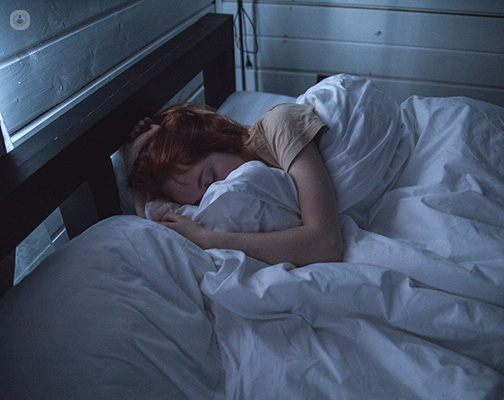


What are parasomnias?
Parasomnias are a group of sleep disorders involving unwanted activity while the patient is asleep, falling asleep or waking up. In most cases, the individual has no memory of what they experienced, with their brain being in a state of sleep at the time.
Types of parasomnia
Some of the most frequent and best-known types of parasomnias are:
- Sleepwalking – a common parasomnia that involves the person getting up and walking around or performs other activities while still asleep. Patients may awaken in a different place from where they fell asleep and be disoriented and confused as to how they got there.
- Night terror – recurrent nightmares that provoke a strong sense of terror, fear, anxiety and anguish to the affected. The patient awakens in a state of intense fear, often with little or no recollection of what the nightmare was about.
- Sleep talking – this is common and generally harmless. Individuals who talk in their sleep generally say nonsensical things that may be related to dreams they are having. Sleep talking can be symptomatic of other sleep disorders, however.
- Betwetting – common in young children; however, in older children or adults, this could be a sign of mental stress, a medical condition, or a problem with the body’s self-waking mechanism when the bladder is full.
- REM sleep behaviour disorder – the individual may act out vivid dreams, including kicking, punching, and flailing about, making this disorder potentially dangerous to the patient and those around them. Episodes can get worse over time.
- Sleep paralysis – patients may find themselves unable to move while waking up or falling asleep. This can be a terrifying experience, with patients reporting being awake but unable to move for seconds or even minutes after waking up. As the brain is still transitioning between sleep and being awake, some patients experience hallucinations while paralysed.
- Confusion arousal – upon waking up, the patient may act in a strange or confused way, with slow speech, poor memory, and short, blunt responses. Once they have woken up fully, they often have no memory of the episode.
What are the symptoms of parasomnias?
The symptoms of parasomnias vary depending on the type of parasomnia that is treated but in general, they can cause discomfort or problems to the affected during sleep, while falling asleep, or while waking up.
Causes of parasomnias
Different parasomnias have different causes, and they may vary from patient to patient. In some cases, there may be no obvious cause. However, many parasomnias are thought to be caused by poor-quality sleep, which may be a result of another sleep disorder, another medical condition, or a mental health disorder. For example, night terrors frequently occur in patients with bipolar disorder, depressive disorders, or a history of mental trauma, while REM sleep behaviour disorder has been linked with sleep apnoea and narcolepsy.
Factors such as substance abuse, alcohol consumption, sleep deprivation, and the use of certain medications are also thought to exacerbate parasomnias.
What is the treatment for parasomnias?
Many parasomnias are harmless and do not require treatment. However, if they affect the patient’s quality of life, a doctor may recommend medication or therapy to deal with the symptoms or the cause of the parasomnia. For example, if the patient is diagnosed with sleep apnoea and this is thought to be the cause, the doctor may recommend treatment with CPAP (continuous positive airway pressure).
